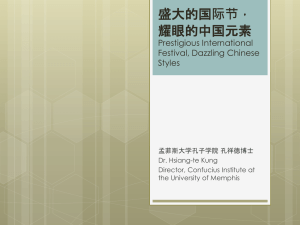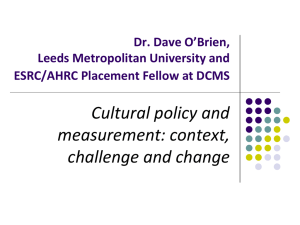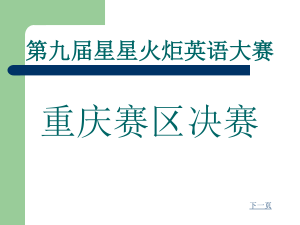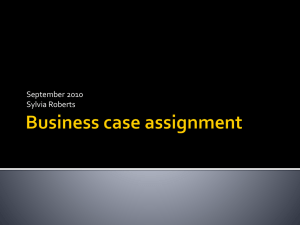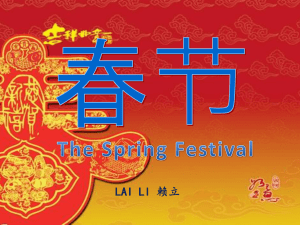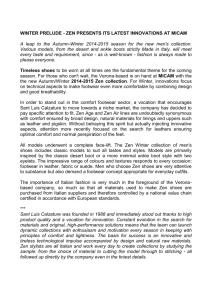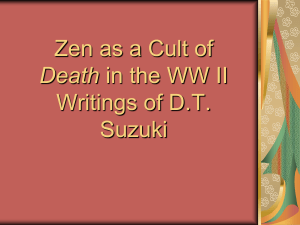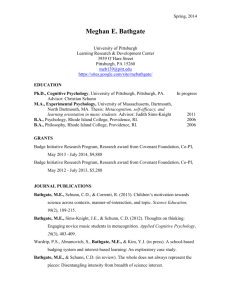Document
advertisement
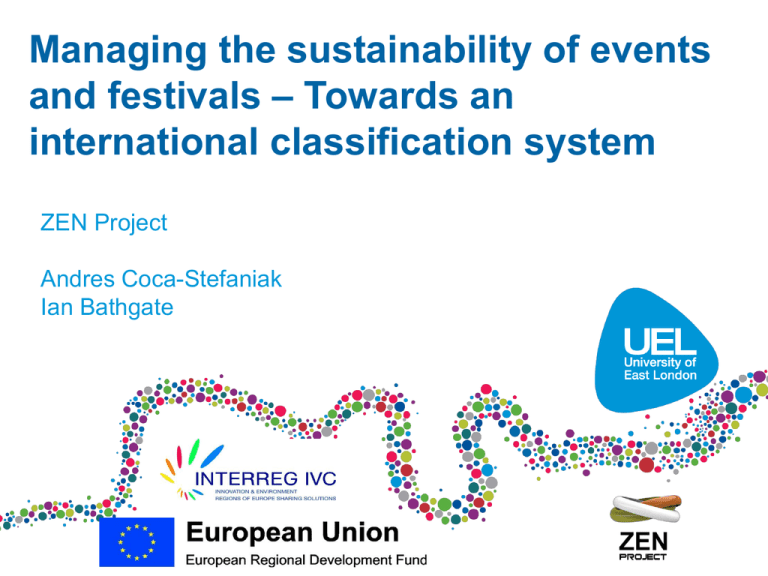
Managing the sustainability of events and festivals – Towards an international classification system ZEN Project Andres Coca-Stefaniak Ian Bathgate Zero-impact Cultural Heritage Event Network (ZEN) ZEN project’s approach • Transnationality (IT, UK, LT, LV, GR, RO, BG, SL, NL, ESP) and practice-based research ZEN project’s aims • European innovation in the development, management and evaluation of sustainable cultural events in historic town centres • Can an event have zero impact on the environment? 2012 pan-Euopean survey festival goers (Moore, 2013) • 49.8% would pay higher ticket price to make festival greener • 43% had changed behaviour as a result of festival’s green initiative(s) • Waste, traffic and noise seen as key negative impacts • Responsibility for impact – festival organiser (but also festival goers – 79%) Sample size: 2,281 Buckinghamshire New University Why evaluate impacts of events? • City image (Richards and Wilson, 2004) • Justify public spending (Faulkner et al, 2003) • Host communities getting best possible benefits (Chalip, 2004; O’Brien 2006) • Lasting legacy for communities (Ritchie, 2000) Example of legacy-focused evaluation framework Sport and physical activity 2012 Olympic and Paralympic impacts Economic Climate change Air Environmental Noise and light Land Ecosystems Water Waste DCMS (2012; p. 22) Culture and community From monitoring to legacy and … beyond? Outcom Objective e sub area Source Noise and light Mayor of • Noise levels London’s • Light levels Five Legacy Commitment s Deliver a sustainable Games and develop sustainable communities Output indicators Monitoring DCMS (2012; p. 35) Outcome indicators • Impact on residents, visitors and businesses measured through surveys Legacy Events research and practice in the UK Holistic understanding of events 2010 and beyond Partnership management 2000 Legacy Culture Mid 1990s Early 1990s 1980s Community interaction Urban renewal Resident attitudes Environmental impact Social (local) impact Segmentation-led promotion Place experience marketing Destination image Urban tourism Hallmark events Mega events Economic impact Coca-Stefaniak (2012) - on-going research Rural festivals Review of event management academic papers in “Festival Management and Event Tourism” (adapted from Getz, 2002) 1. 2. 3. 4. 5. 6. 7. 8. 9. 10. Economic impact (26 articles) Corporate sponsorship and marketing (14 articles) Marketing and segmentation (11 articles) Other management issues (9 articles) Visitor and participant motives (7 articles) Education, training, accreditation, research (7 articles) Politics, policy and planning (4 articles) Urban renewal (2 articles) Law (1 article) Arts and culture (1 article) Early ZEN project research findings • Event environmental stewardship as promotion element (IT) • Transition from spontaneity to visitorfocused event planning (BG) • Events closely linked to local and regional branding campaigns (LV) • Accreditation of good sustainability practices (Green Key, NL) • Identity – heritage-led event transition from Communism to market-led economy (LT, LV) • Cost efficiencies and external funding through environmental innovation (UK, IT) Towards an international typology of sustainable cultural events Mega event Public funding Low ‘core’ carbon footprint High ‘core’ carbon footprint Private funding Micro event Coca-Stefaniak (2013), on-going research So what? … Moving research forward in evaluation of sustainable events • • • • • • Events as test beds for innovation in sustainable solutions (e.g. EU-wide accreditation system?) Events as more than standard bearers (vis-a-vis strategic place branding) CSR research v. event environmental impact research Marketing ‘authenticity’ or commoditification of visitor experience? Experiential marketing strategies? Government policy impact (e.g. Welsh Assembly Sustainable Development Bill) Thank you Dr. Andres Coca-Stefaniak j.a.coca-stefaniak@uel.ac.uk Ian Bathgate i.bathgate@uel.ac.uk www.zen-project.eu References - Coca-Stefaniak J.A., Rinaldi R., Parker C. and Quin S. (2009), “Evolution of town centre and place management models: a European perspective”, Cities, 26 (2), pp. 74-80. - Coca-Stefaniak J.A. (2012), Evolution of international town centre management models, Doctoral thesis, Middlesex University. - Chalip L (2004), Beyond impact: A general model for host community event leverage. In: Ritchie B and Adair D (eds.), Sport Tourism: Interrelationships, Impacts and Issues, Clevedon: Channel View Publications, pp. 226-252. - DCMS (2012), London 2012 Olympic and Paralympic Games Impacts and Legacy Evaluation Framework Final Report, Department for Culture, Media and Sport, http://www.culture.gov.uk/images/publications/DCMS_2012_Games_Meta_evaluati on_Report_1.pdf (accessed 24 August 2012) - Faulkner B, Chalip L, Brown G, Jago L, March R and Woodside A (2003), “Monitoring the tourism impacts of the Sydney 2000 Olympics”, Event Management, 6 (4), pp. 231-246. References - Getz D (2002), “Event studies and event management: On becoming and academic discipline”, Journal of Hospitality and Tourism Management, 9 (1), pp. 1223. - Innes J E and Boother D E (2000), “Indicators for sustainable communities: A strategy building on complexity theory and distributed intelligence”, Planning Theory & Practice, 1 (2), pp. 173-186. - Mega V and Pedersen J (1998), Urban sustainability indicators, European Foundation for the Improvement of Living and Working Conditions, http://eurofound.europa.eu/pubdocs/1998/07/en/1/ef9807en.pdf (accessed 22 August 2012) - Moore T (2013), Audience attitudes on the environmental impact of events CM&SS/AGF, http://www.agreenerfestival.com/wp-content/uploads/pdfs/BucksAGF_AUDIENCE_RESEARCH_2012.pdf (accessed 10 May, 2013). - O’Brien D (2006), Event business leveraging: The Sydney 2000 Olympic Games, Annals of Tourism Research, 33 (1), pp. 240-261. References - Ritchie J R B (2000), “Turning 16 days into 16 years through Olympic Legacies”, Event Management, 6, pp. 155-165. - Richards G and Wilson J (2004), “The impact of cultural events on city image: Rotterdam, Cultural Capital of Europe 2001”, Urban Studies, Vol. 41, No. 10, pp. 1931-1951. - Wood E. (2009), “An impact evaluation framework: local government community festivals”, Event Management, Vol. 12, No. 3/4, pp. 171-185.


